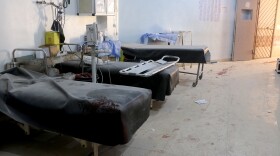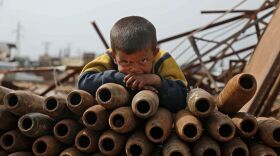
Ruth Sherlock
Ruth Sherlock is an International Correspondent with National Public Radio. She's based in Beirut and reports on Syria and other countries around the Middle East. She was previously the United States Editor for the Daily Telegraph, covering the 2016 US election. Before moving to the US in the spring of 2015, she was the Telegraph's Middle East correspondent.
Sherlock reported from almost every revolution and war of the Arab Spring. She lived in Libya for the duration of the conflict, reporting from opposition front lines. In late 2011 she travelled to Syria, going undercover in regime held areas to document the arrest and torture of antigovernment demonstrators. As the war began in earnest, she hired smugglers to cross into rebel held parts of Syria from Turkey and Lebanon. She also developed contacts on the regime side of the conflict, and was given rare access in government held areas.
Her Libya coverage won her the Young Journalist of the Year prize at British Press Awards. In 2014, she was shortlisted at the British Journalism Awards for her investigation into the Syrian regime's continued use of chemical weapons. She has twice been a finalist for the Gaby Rado Award with Amnesty International for reporting with a focus on human rights. With NPR, in 2020, her reporting for the Embedded podcast was shortlisted for the prestigious Livingston Award.
-
In Iraq, where COVID-19 is surging, the death toll from a fire in the coronavirus ward of a hospital continues to climb. Officials say more than 90 people have died and dozens more have been injured.
-
On Monday, flames swept through outbuildings of the al-Hussein Teaching Hospital in Nasiryah that had been set up to isolate COVID-19 patients.
-
It was a decision that appalled and angered Syrian opposition groups and international medical organizations. On May 28 Syria was appointed to the World Health Organization's Executive Board.
-
The dictator's choice of voting location sent "a message telling the opposition that we are celebrating through your demise," one Syrian analyst tells NPR. The government said Thursday that Assad won.
-
For a week and a half, Gazans have taken cover in their stairwells and other parts of the house, eating canned foods and hoping they can run out in time — if an airstrike warning comes.
-
"This is an embarrassing time for Gulf countries," says political scientist Bessma Momani. "Ultimately, they gave Israel a normalization deal, but didn't really extract anything for the Palestinians."
-
Misinformation about the coronavirus has been catching on easily in Lebanon, where sectarian rivalries leave groups searching for answers that back their world view.
-
Some of the country's last beaches spared from development are now carpeted in globs of tar from an oil spill in the Mediterranean, damaging beaches that are nesting grounds for endangered turtles.
-
The conflict has not only pitted the regime of Syrian President Bashar Assad against a band of rebels, but drawn the U.S., Iran, Russia and Turkey, among others, into a complex proxy war.
-
Mistrust towards China-produced vaccines, general vaccine hesitancy and distribution complications have all been obstacles in getting the vaccine out in some countries.







